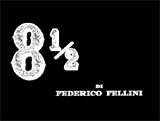
|
8 1/2 (1963, It.) (aka Otto e Mezzo)
In Federico Fellini's sprawling, surreal fantasy drama
about the breakdown and descent into madness of the protagonist -
a stressed-out film-making director planning to make his next movie,
a science-fiction epic:
- the bizarre, allegorical, subjectively-viewed opening
dream sequence: a massive traffic jam in a tunnel, and feeling
trapped, asphyxiated and gasping for air in his own claustrophobic
car, the harried film director Guido Anselmi (Marcello Mastroianni)
struggled in desperation and pounded on his car windows; he emerged
from the roof of his car, stood with his arms outstretched and
his black cape unfurled as he walked forward, and he found himself
floating away and escaping by sailing off into the clouds; his
freedom was short-lived, since his ankle was attached to a kite
line held by a man on the beach far below with another man riding
on horseback (his associates: the producers of the film Guido was
directing); Guido was tugged down to earth ("Down, you come
down") and tumbled into the water
- the many flashbacks and retreats to the director's
boyhood memories, and the numerous flights of fantasy and dream sequences,
anxious nightmares, and day-dreaming wish-fulfillments
- the flashback to Guido's impressionable youth - a
beach scene when he joined with a group of boys to watch "The
Saraghina" (Edra Gale) - a fat prostitute who was paid to teasingly
dance a rumba, and even invited Guido to dance with her outside her
beachside shack
- the visionary, over-exposed appearance of Guido's
beautiful dream girl Claudia (Claudia Cardinale) with whom he found
solace, on spa grounds where he was recuperating; as Guido adjusted
his sunglasses, he imagined that she glided into view from the forest
(to the tune of Rossini's "Barber of Seville" overture),
dressed in white; as his salvation, she offered him a glass of purifying
and healing mineral water - but then she reverted to one of the spa
attendants
|
Guido's Dream Girl Claudia
|
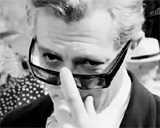
|
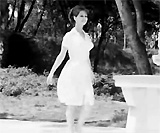
|
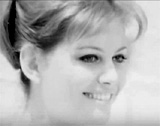
|
- the other females in Guido's life - his cheap but
sexy mistress Carla (Sandra Milo), and his intellectual, estranged
wife Luisa (Anouk Aimée), who knew of his promiscuity
- the steamroom bath scene of Guido's short audience
with a Cardinal (Tito Masini), when Guido spoke of his unhappiness:
("Your Eminence, I'm not happy") and the Cardinal only
responded with Latin catechism quotes: ("Why should you be?
That isn't your job. Who told you we come into the world to be happy?
Origen says in his homilies: Extra Ecclesiam nulla salus.
There's no salvation outside the church. Extra Ecclesiam, nemo
salvatur. No one will meet salvation, outside the church. Salus
extra Ecclesiam, non est. There's no salvation outside the church. Civitas
Dei. He who isn't in the City of God, belongs to the City of
the Devil")
- the dance sequence where young, dark-haired
"student" Gloria Morin (Barbara Steele) danced with white-haired,
elderly Mario Mezzabotta (Mario Pizu), Guido's producer friend
- the stream-of-consciousness 'harem scene' at the spa
actually began when Guido was at an outdoor cafe with his wife Luisa
and her best friend and his lover Carla; to escape, he imagined all
the women in his life living together in a harem; when he arrived
at the door, everyone cried out: "The Emir is here!" -
the females included "The Saraghina,"
Luisa, Carla, Gloria, his star actress Claudia, and a dancing "black
girl" from 'Hawaii' and many others; after he distributed gift
parcels, the attendants prepared him for a bath, undressed him, and
put him in a tub of hot water; later, he was removed and wrapped in
a white robe, sprinkled with talc, and pampered like a child; to the
tune of Wagner's "Ride of the Valkyries" while wearing a
black cowboy hat, Guido grabbed a whip to attempt to tame and control
the rebellious females when they complained about his enforcement of
the rules, and his double standard about aging in regards to one rejected
showgirl: ("Discard us after squeezing us dry!...You're a monster!...Down
with Bluebeard! We have a right to be loved to the age of 70!...Who
does he think he is, a boy? It's time he knew he's a lousy lover. Sweet
nothings, that's all. Then he falls asleep") - the rule was that
discarded, overaged women were forced upstairs; Luisa explained Guido's
behavior: "It's a need he has, he does it most nights"; soon
after Guido's punishing reprimands, the rebellious women calmed down,
and the group applauded him
- the press-conference sequence - surrounded, assailed
and finding himself unable to answer hostile questions of reporters
and producers, the confused and indecisive Guido thought the film
project would be abandoned and the set dismantled; he crawled under
a table, and took a gun out of his pocket; a gunshot was followed
by a close-up of the back of Guido's head slowly hitting the ground
- Was it another fantasy? Or had he killed himself?
- the carnival finale sequence - on a field where a
massive steel-girded structure or scaffolding had been built (a giant-sized
spaceship for the movie production); a resigned Guido walked away
from the set that was about to be taken apart, when he heard the
words of cinema critic and writer Carini (Jean Rougeul), a manifestation
of his own intellect, who advised and reasoned with him as they proceeded
to his car; while listening, Guido was basically convinced to quit
his creative profession, and walk away from the terminated project: "You've
made the right choice. Believe me, today is a good day for you. These
are tough decisions, I know. But we intellectuals, and I say 'we'
- because I consider you such, must remain lucid to the bitter end.
This life is so full of confusion already, that there's no need to
add chaos to chaos. Losing money is part of a producer's job. I congratulate
you. You had no choice. And he got what he deserved for having joined
such a frivolous venture so lightheartedly. Believe me, no need for
remorse. Destroying is better than creating when we're not creating
those few, truly necessary things. But then is there anything so
clear and right that it deserves to live in this world? For him,
the wrong movie is only a financial matter. But for you, at this
point, it could have been the end. Better to quit and strew the ground
with salt, as the ancients did, to purify the battlefields. In the
end, what we need is some hygiene, some cleanliness, disinfection.
We're smothered by images, words and sounds that have no right to
exist, coming from, and bound for, nothingness. Of any artist truly
worth the name we should ask nothing except this act of faith: to
learn silence. Do you remember Mallarme's homage to the white page?
And Rimbaud - a poet, my friend, not a movie director. What was his
finest poetry? His refusal to continue writing and his departure
for Africa. If we can't have everything, true perfection is nothingness.
Forgive men for quoting all the time. But we critics do what we can.
Our true mission is sweeping away the thousands of miscarriages that
everyday - obscenely - try to come to the light. And you would actually
dare leave behind you a whole film, like a cripple who leaves behind
his crooked footprint. Such a monstrous presumption to think that
others could benefit from the squalid catalogue of your mistakes!
And how do you benefit from stringing together the tattered pieces
of your life? Your vague memories, the faces of people that you were
never able to love... "
- Guido's redemption in the conclusion - he had a revelation
that he needed to accept his life for what it was; when he saw his
wife Luisa, part of a procession of figures dressed in white who
appeared (all the people in Guido's life?), he reconsidered and spoke: "What
is this flash of joy that's giving me new life? Please forgive me
sweet creatures; I didn't realize, I didn't know. How right it is
to accept you, to love, you - and how simple! Luisa, I feel I've
been set free. Everything looks good to me, it has a sense, it's
true. How I wish I could explain, but I can't - everything's going
back to what it was. Everything's confused again, but that confusion
is me; how I am, not how I'd like to be. And I'm not afraid to tell
the truth now, what I don't know, what I'm seeking. Only like that
do I feel alive and I can look into your loyal eyes without shame.
Life is a party, let's live it together. I can't say anything else,
to you or others. Take me as I am, if you can. It's the only way
we can try to find each other"; meanwhile, a top-hatted, white-faced
character (a magician or ringmaster) with a baton had interrupted
and announced: "We're ready to begin"
- in the next segment, a rag-tag parade of circus clowns
also appeared (Guido as a boy wearing white was the last one in the
line, playing a flute) and marched toward the scaffolding; director
Guido grabbed a megaphone-bullhorn to guide and direct the action;
the entire cast of the film appeared from behind a opening curtain
and descended down the steel stairs of the space-ship scaffolding;
Guido waved to his mother and father, and then he took his wife Luisa's
hand to join in the jumbled yet happy procession performing a circle
dance; in the final moments, the movie set transformed into a circus
ring where the young Guido led the clowns, and then was left alone
in the ring to play a flute (illuminated in a dwindling spotlight)
as he marched off
|
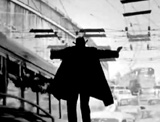
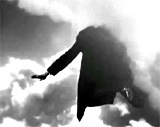
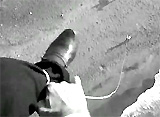
Opening Dream Sequence
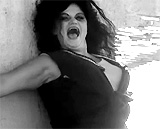
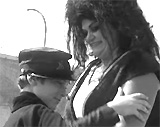
Beach Scene with Prostitute
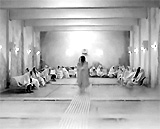
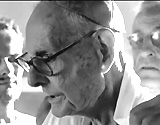
Steamroom Bath Scene with Cardinal
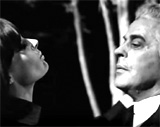
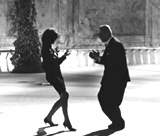
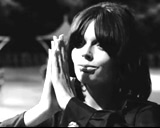
Dance Between Gloria and Mario
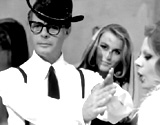
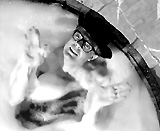
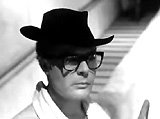
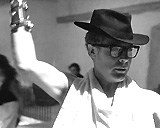
"Harem" Sequence
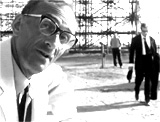
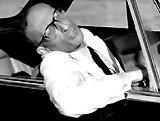
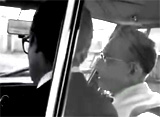
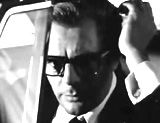
Words of Advice From Cinema Critic and Writer Carini
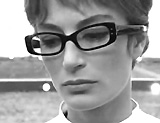
Wife Luisa
|




















